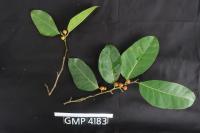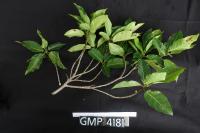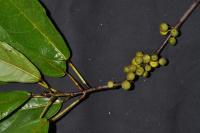Your search for * in family Moraceae has returned 5 entries
fioata
n. Tree to 10 m, dbh 30 cm. (collection: Michael J. Balick #5213)
Example: The stems of this tree are good for firewood. (authorities: Naumeta Rose (male, 32), Paul Fatapa (male, 74))
bookmarkfoi’ata

[ɸoi’ata] n. banyan-forming fig tree, 5 m tall (collection: Gregory M. Plunkett #4183)
Example: The fiber of this plant is used as a rope. Collect the young shoots, strip off bark and use fresh as a rope, especially to tie and carry baskets or firewood. The birds eat fruits; hunters know this and they hunt there.
bookmarknairea
n. type of plant (collection: Michael J. Balick #5233)
Example: Birds eat this fruit. Hunters know this and hunt near this tree when the fruits are ripe. Second use contributed by Samuel Seru. To treat gonorrhea. Scrape inner bark of the stem to fill 1/3 of a cup. Then fill with cool water and drink 1 x daily for 5 days in the morning. (authorities: Naumeta Rose (male, 32), Paul Fatapa (male, 74), Samuel Seru (male, 31))
bookmarknasitau

romaji

[romaʃi] n. tree, 8 m tall (collection: Gregory M. Plunkett #4182)
Example: The young leaves are edible. Boil them for 30 minutes, and eat. The fruits are also edible and are eaten. Boil fruits 1 hour and eat with coconut. Also, you can wrap the leaves of this plant with Cordyline fruitcosa (MJB 4180) leaves and bake in fire, adding meat as well.
bookmark


